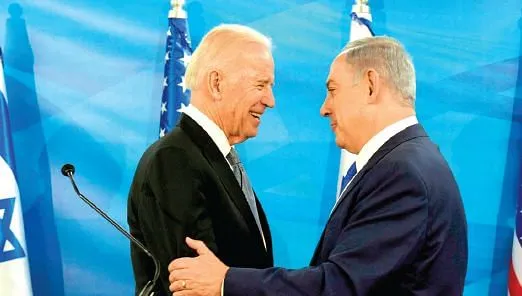The White House announced on June 14 that President Joe Biden will undertake a tour of West Asia on July 13-16. His visit will take him to Israel and Saudi Arabia and also the West Bank.
A senior US official, in a background briefing, projected the trip as part of Biden’s commitment to engage the world.
As a Presidential candidate he had vehemently criticised his predecessor President Donald Trump for following a policy of disengaging the US from the world.
Biden had then asserted that as the world’s pre-eminent power the US could not afford to allow geo-political vacuums to develop because China and other states inimical to the US would rush to fill in these vacated spaces.
Biden’s West Asian tour would be eagerly and closely followed by the regional states. It will occur at a time of great international and regional dissonance because of a range of issues. These stretch from the dislocation caused by Russia’s invasion of Ukraine to China’s aggressive moves in Asia as a whole, including in Iran to moves and countermoves by regional states across West Asia.
Clearly, among Biden’s objectives during his stay in West Asia would be to strongly signal the continuing comprehensive US commitment to Israel and to consolidate US-Saudi relations. US support for Israel has been an anchor of its West Asian policy.
This goes back to the creation of Israel in which the US played a notable part. There have been a few occasions such as in 1956 when the US compelled Israel and Britain and France to roll back their armed action against Egypt; but except for these for the US, Israel can do no wrong.
This has led to enduring bitterness among sections of Arab opinion against the US but that has never led it to change course. The Jewish lobby is very influential in domestic US politics. This too has been a major factor for US approaches towards Israel and West Asia as a whole.
As a candidate Biden had vehemently criticised Saudi Crown Prince Mohammed bin Salman (MBS) for his alleged role in the murder of the famous journalist Jamal Khashoggi in the Saudi Arabian consulate in Istanbul in October 2018.
Soon after becoming President last year Biden authorised the release of a US intelligence report which assessed that MBS had “approved an operation in Istanbul, Turkey to capture or kill” Khashoggi.
Along with this report being made public the Biden administration sanctioned some Saudi individuals who it alleged were involved in the Khashoggi operation.
It also tightened its visa policy to prevent entry of foreigners who undertook anti dissident actions on the instructions of their governments. Significantly, however, the Biden administration did not sanction or take any action against MBS. The White House spokesperson did say though that the US will “re-calibrate” its ties with Saudi Arabia.
Far from doing that Biden’s visit, during which he can hardly avoid meeting MBS, demonstrates how great powers allow the leaders of other countries to get away with murder if it suits their national interests.
Indeed, during his visit to Riyadh Biden will interact with the leaders of all Gulf countries who will be in the Saudi capital for a summit of the Gulf Cooperation Council.
All these countries are autocratic with dismal human rights records. For all its emphasis on the protection of civil and fundamental rights of peoples the US never allows these to come in the way of the promotion of its core interests.
While he is in Israel Biden will travel to the West Bank to interact with the Palestinian leadership. According to an unnamed US senior official Biden will be “reaffirming his lifelong commitment to a two-state solution and to discuss the ways in which we might rekindle a new political horizon that can ensure equal measures of freedom, security, prosperity and dignity to Israelis and Palestinians alike”.
For all these fine words the fact is that the Israel-Palestine issue will be no closer to a resolution irrespective of whatever Biden may say or do. It is truly intractable because the differences between the two sides are simply too vast.
The senior US official also said “The visit will also focus on Israel’s increasing integration into the region, both through the Abraham Accords with UAE, Morocco and Bahrain; through deepening ties between Israel, Jordan and Egypt; and also an entirely new grouping of partners, including Israel, India, UAE and the United States—what we call I2U2”. The official added that Biden will hold a virtual summit with I2U2 leaders when he is in Israel. Earlier in October 2021 External Affairs Minister S Jaishankar had participated in a virtual I2U2 meeting at Foreign Ministers level while he was on a visit to Israel.
It is significant that the US has placed the I2U2 grouping in the context of Israel’s integration with the region. While that may be a US objective it is hardly in keeping with the basic approach India has pursued towards West Asia till now.
That approach has relied on deepening bilateral ties with all significant West Asian countries and avoid getting entangled in their mutual differences. This policy has served India well in a region which is vital for our economic interests and has security connotations too. It is true that China has made major inroads in Iran.
India has to take steps to ensure that China’s role does not become malignant to its interests in West Asia as a whole. While taking necessary measures to do so it must also ensure that it preserves its ties with all West Asian countries in an independent manner.
Disclaimer: The views and opinions expressed in this article are the personal opinions of the author.
The facts, analysis, assumptions and perspective appearing in the article do not reflect the views of GK.







